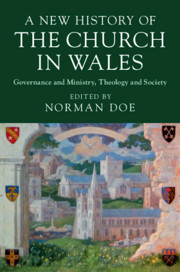Book contents
- Reviews
- A New History of the Church in Wales
- A New History of the Church in Wales
- Copyright page
- Contents
- Plates
- Contributors
- Foreword
- Editorial Preface
- Introduction
- Part I Historical Antecedents and Overview of the Century
- Part II Governance and Ministry
- Part III Doctrine, Liturgy, Rites and Other Faith Communities
- Part IV The Church and Society
- 13 Welsh Anglicans and Cultural Debate
- 14 The Church and Education
- 15 The Church and the Welsh Language
- 16 The Church, State and Society
- Part V Conclusions
- Bibliography
- Index
- Plate Section (PDF Only)
14 - The Church and Education
from Part IV - The Church and Society
Published online by Cambridge University Press: 22 February 2020
- Reviews
- A New History of the Church in Wales
- A New History of the Church in Wales
- Copyright page
- Contents
- Plates
- Contributors
- Foreword
- Editorial Preface
- Introduction
- Part I Historical Antecedents and Overview of the Century
- Part II Governance and Ministry
- Part III Doctrine, Liturgy, Rites and Other Faith Communities
- Part IV The Church and Society
- 13 Welsh Anglicans and Cultural Debate
- 14 The Church and Education
- 15 The Church and the Welsh Language
- 16 The Church, State and Society
- Part V Conclusions
- Bibliography
- Index
- Plate Section (PDF Only)
Summary
This chapter provides a history of Church in Wales schools since disestablishment in 1920, using as its starting point the impact of landmark parliamentary statutes on education in Wales in general and on the church and its schools in particular. What emerges is the church's longstanding commitment to the value of education and its desire for education in its schools to be freely available. These themes have persisted across the century amid the changing social and economic conditions of Wales. The century is also characterised by partnership between Church and State in the field of education. Yet the Christian distinctiveness of a church school has throughout been predicated on a foundation of Christian values. Across the century, the Church in Wales invested, at provincial and diocesan levels, in education, in the training of teachers, in physical buildings, and in the infrastructure of the syllabus and standards. As an active stakeholder in education and a strong partner with civil government, before and after devolution, the Church in Wales has collaborated in making seminal legislation, policy and practice. Church Schools are not simply for worshipping Anglicans, nor do they seek to proselytise. Rather, they offer an education to all, of the highest standards based on Christian values at the heart of Welsh communities.
- Type
- Chapter
- Information
- A New History of the Church in WalesGovernance and Ministry, Theology and Society, pp. 257 - 274Publisher: Cambridge University PressPrint publication year: 2020

